- Home
- Shannon Hale
Princess Academy Page 8
Princess Academy Read online
Page 8
More and more often, the girls looked up from their books and toward the heartening sight of Mount Eskel’s peak, shedding white for brown and green. Miri could not think of returning home without a plummeting sensation in her belly. She hoped so powerfully to be able to share the secrets of Commerce and change trading for her village that she nearly trembled with it. Then, the day before they planned on making the trek for spring holiday, Olana announced a test.
“I know you think to return tomorrow,” said Olana. “Your spring holiday is not a Danlander tradition, and this academy is under no obligation to honor it. Let the exam determine if you’ve earned the right to return home. Those who don’t pass will remain at the academy, engaged in personal study.”
The testing began with reading aloud, and Miri winced when Frid struggled with the big words and Gerti had no comprehension of the text on the page. Olana asked questions on History, Geography, and Kings and Queens, and the girls wrote out their answers on clay tablets. They walked across the room to exhibit Poise and conversed in pairs. Olana kept track of each girl’s progress on a piece of parchment.
As painful as the testing was, Olana made it worse by declaring she would not give the scores until the next day.
“It will be good for you to ponder your performance until morning,” said Olana.
In their bedchamber, Miri heard panicked whispering late into the night.
“I have to go home.”
“Me too. No matter what.”
“I know I failed. I’m sure I did. All the questions were so hard.”
“She hates us. She’ll fail us all just to be mean.”
“Shush, or she’ll fail us for talking.”
The next morning, the girls sat so straight that they did not touch the backs of their chairs. The weight of Miri’s desire to return home made her feel lopsided and giddy. If Olana won’t let me go, she thought, I may have to run. But she was not ready to give up on the academy either, on all she was learning, on the hopes of becoming academy princess and being that special one, even on the rough and furtive yearning that she would not let herself think on too long—leaving the mountain, giving her pa the house in the painting, becoming a princess.
“Well,” said Olana, facing the class with hands clasped behind her back. “Any guesses?”
No one answered.
“No need to drag it out,” said Olana, and someone snorted at the comment. “You all failed.”
A collective gasp went up.
“Except Miri and Katar.”
Miri exchanged looks with Katar and saw that the other girl was pleased.
“You both may go.” Olana waved them off.
Katar walked to the door and turned, waiting. Miri had not moved.
“Tutor Olana.” Miri swallowed and spoke a little louder. “Tutor Olana, that doesn’t seem fair.”
“Passing the test doesn’t give you freedom to speak out, Miri,” said Olana. “Go this moment or forfeit your right to go at all. Now, the rest of you are miles behind where you should be, and I will not have you mortify me in front of the chief delegate and the prince. I will busy myself elsewhere in the building for the next couple of days. I’d rather not see much of you, which means I had better not hear much from you.”
Miri had not left her seat. If she went with Katar, the others girls might never forgive her, but if she stayed, she could not deliver her news before the first trading of the season. She pressed her hands on her chair, wanting to stand, afraid to do so. Katar made exaggerated expressions of impatience by widening her eyes and tapping her foot.
Before Miri could make up her mind, Esa stood, her face a burning red. She clenched her left arm with her right hand.
“No,” said Esa.
Olana turned her icy glare to Esa. “What was that?”
“I said . . . I said,” Esa stuttered. She blinked many times, and tears began to leak from her eyes. “I said, no. I said, I’m going to spring holiday, and I don’t care what happens.”
Miri stared at Esa and felt as breathless as if she had fallen on her back. Esa was the one girl who had never missed a meal or received a palm lashing, always holding her tongue, always obedient.
Miri could see no hope in Esa’s face. She seemed to cringe, waiting for the inevitable punishment, knowing she would never be allowed to leave but unable to stop her protest.
Never hesitate if you know it’s right. Miri was going to spring holiday, and she wanted everyone to go with her. If they ran all at once, she believed Olana and the soldiers could not stop them.
“A few hours in the closet might chill the impudence out of you,” Olana was saying.
Miri knew she had to act before Olana called the soldiers or locked Esa up. After months of cold tension, she was afraid she could not convince the girls to run home. Besides, she would not be able to talk for long before Olana would have the soldiers haul her away. No, her gut told her that the only way to communicate her plea to run was to use quarry-speech.
She did not know if it was possible to say something so specific; she had never tried. But if quarry-speech used memories, could she convey more than just quarry warnings? Could she tell everyone to run?
Miri stomped her foot on the linder floorstones and sang out loud, hoping to distract Olana from taking Esa to the closet. “No wolf falters before the bite. So strike. No hawk wavers before the dive. Just strike.” It was a song for wedge work, when every stroke was critical. If any quarrier in the line delayed a strike, the crack could split the wrong way and ruin the linder block. There could be no hesitation.
Olana gaped at Miri stomping and singing. That made Miri laugh.
“That’s enough,” said Olana.
“No sun pauses before the set, so swing,” Miri sang on, while her thoughts dashed around, trying to find a common memory that would encourage all the girls to run at once. “No rain delays before the fall. Just swing.” Then she had it—Rabbit and Wolf, a game all villagers knew. The children would sit in a circle and the child who was the “wolf” chased the “rabbit” around the outside of the circle, trying to touch her hair. If the wolf touched the rabbit anywhere else, it was an unfair touch. The rabbit yelled, “Rabbits, run!” and all the children stood and ran.
Miri seized this memory and sang it with her thoughts, down into the beating of her boot, down into the linder.
The sight of Olana shivered, and her memory of the game expanded, seeming immediate and clear. Half the girls stood right up, and the rest flinched or jumped or shook their heads as if trying to jiggle water out of their ears. Only Britta and Olana did not react.
“What is going on?” Olana looked around. She seemed too bewildered by the odd behavior to know what to do. “Why are you standing?”
Again Miri sang the memory in quarry-speech, and the rest of the girls stood. Even Bena and Katar had knowing smiles on their faces. Miri took Britta’s arm and whispered, “We’re going home now.”
Despite her tears, Esa grinned. “Rabbits, run.”
Some of the girls squealed with delight and fear as they darted out of the classroom and dashed down the steps.
Behind them, Olana bellowed, “If you leave now, don’t think about coming back! Do you hear me?”
They laughed as they ran. It was still morning, and the chilly air of early spring nipped and butted Miri’s skin. She would make it home. She would have a chance to tell her pa about Commerce. She wanted to hug the whole world.
“Shouldn’t we hurry?” asked Gerti, looking over her shoulder. “What if the soldiers catch us?”
“One of us is going to be the princess one day,” said Miri. “What can they do, run us all through with their swords?”
Thirteen-year-old Jetta shrieked, and the others laughed at her fright. The soldiers did not follow, and the girls slowed to a walk, tal
king over everything they must have missed at home these last months and all that they would do for spring holiday. Miri took Britta’s hand, and Esa and Frid walked with them.
“I guess we’ve being playing Wolf and Rabbit with Olana all along,” said Miri, “but when she picks on Esa, that’s an unfair touch. I’m glad we ran.”
“So am I,” said Esa. “I was in the closet for sure.”
“And it’s time that rat’s reign of terror ended.” Miri stole a sideways glance at Esa, then looked back at the road. “I never apologized for getting everyone in trouble, and then I was too embarrassed to speak up. I thought you wouldn’t forgive me, but I am sorry.”
Frid’s eyes widened. “Oh. I thought all along you were mad at us.”
“You did?”
“You always stayed inside reading and didn’t talk to us. I guessed you were angry that we didn’t take your side against Katar.”
Miri laughed, pleased. “And I thought you were too angry to talk to me.”
“Miri, I’m dying to know,” said Esa. “That was you who quarry-spoke back there, wasn’t it? It felt like you. But how did you do it? I’ve never heard anyone say, ‘Rabbits, run!’ before, and outside the quarry!”
They were walking through a quarry some hundred years deserted, but patches of linder too thin to mine still gleamed through the mud and rock shards. Miri crouched on a lean slab, tapped the rhythm with her fist, and chose a memory. At age three, she and Esa had wriggled out of Doter’s notice and scampered dangerously close to the cliff’s edge. “Take care!” Doter had shouted before pulling them to safety. Take care, Miri now quarry-spoke.
Frid’s mouth hung open, and Esa nodded and smiled.
“I didn’t think it was possible outside our quarry,” said Frid.
“What did you just see?” asked Miri.
“See?” asked Esa. “What do you mean? I heard a warning about being careful and coming away from an edge.”
“But does anything else occur to you? A memory of anything?” Miri rapped again, sang aloud, and sang inside.
“I guess one time when you and I almost fell off the cliff and my ma pulled us back.”
“Me too!” said Miri. “But what does it remind you of, Frid?”
“When Os was on a block high in the quarry, and I saw him lose his balance and fall.”
Miri clapped her hands together. “It must be true. I’ve been thinking that quarry-speech works in memories. If two people have the same memory, like Esa and me, then we might imagine the same scene. But if not, then the quarry-speech nudges the nearest memory.”
“Maybe that’s why lowlanders can’t hear it,” said Britta. “We don’t have enough shared memories.”
“I’ve been trying to figure out quarry-speech for months,” said Miri, “but I still don’t know why it sometimes works outside the quarry and sometimes not.”
Esa shielded her eyes to spot the rest of the girls walking on the road ahead. “Let’s think about it later. I’m dying for some honeyed nuts.”
The four girls skipped to catch up with the others and hollered spring songs all the way home.
n
Chapter Eleven
I’ll raise the ladle to your lips,
Drip water on your fingertips,
And stay although my heart says flee.
Will you look up and smile at me?
n
That afternoon, the sounds of song greeted them at the outskirts of the village. Dozens of voices carried the melody, and slapping drums and clapping hands thrummed the beat. The girls recognized the tune and rhythm of the empty barrel dance, the first dance of spring holiday.
“Hurry up,” said Esa. “They’ll need us, or most of the boys will be dancing alone.”
The girls broke into a run, and the noise of their boots on the roadway sounded like a night rockfall.
“We’re here, we’re back!” some shouted, and when they came into view of the village center, a cheer went up. The clapping broke from its dance rhythm into applause for their entrance, and parents and siblings shouted and leaped forward to embrace them. Miri looked for Marda and her father and was about to despair when they rushed her from behind.
Her pa lifted her in the air and spun her around as if she were still a little girl. Marda was there as well, kissing her cheeks and warming her cold hands. Miri’s eyes felt watery, and she put her face against her pa’s chest.
“Are you all right?” asked Marda.
She nodded, still hiding her face. “I just missed you all. I guess I missed you a lot.”
The holiday was the best in Miri’s memory. Frid beamed so proudly when she took first place the stone-hurling contest, she seemed to forget that she had won every year since she was twelve. The food was better than Miri could ever have described to Britta, and the cheering never really died out. Everything seemed worthy of applause.
Frid’s pa announced the ribbon dances with a strum of his three-stringed yipper, and Doter handed out the tattered red strips of cloth that were older than any grandparent. Jans, a pale, serious boy, trailed Britta around like a thistleweed stuck to her bootlace. He begged her for one more dance, and then one more, so for an hour she shared her ribbon with Jans, high stepping and twisting and smiling wider than Miri had ever seen.
Miri herself danced so hard that she could scarcely breathe. She saw Peder dancing with Bena and then Liana and had given up hoping when a new song began and she found him on the other end of her ribbon. She would have talked and teased and laughed with him, but his sudden appearance had startled her, and she did not know if she could keep up her carefree façade. Her gaze fell on the ground, her heart beating faster than the drums.
After a time, she did not see Peder anymore among the dancers, and she nestled close to her father and watched the toddlers twirl and hop. When night fell the story shouts began. The grandfathers told the somber story of the creator god first speaking to people; then the mothers recited the one that began, “One lifetime ago bandits came to Mount Eskel.”
After the bandit story, Os said, “Let’s hear a tale from our girls come home.”
Bena, as the oldest, stood and chose her story, a silly romp of a tale where each line was invented as it was told. “The girl with no hair left home to wander hills where she was not known,” she shouted, then pointed to Liana, who sat at another fire.
“An eagle mistook her for her fallen egg and carried her up to its nest,” shouted Liana, pointing to Frid.
“A quarrier plucked her from the eagle’s nest, thinking her a good stone to break.” Frid pointed to Gerti.
The story continued, each academy girl selecting another to continue the tale. Miri inched up to sit on her heels, hoping to be seen. No one looked her way. Bena had three turns, and even Britta was chosen once, inventing a clever line about a bear mistaking her for a mushroom cap. Then Esa shouted, “Last line!” and pointed to Miri.
Miri stood, her smile impossible to hide. “With her bald head shining like a gold crown, a wandering prince mistook her for an academy princess and carried her away to his palace.”
The crowd burst into cheers and laughter.
The festivities slowed and families clustered around fires, drinking tea, with honey if they were lucky, and singing sleepy tunes. Miri’s gaze wandered over the faces lit by the bonfires until she discovered Peder just beyond the ring of orange light.
Miri had not spoken a word to him since returning, and she realized now that she might have seemed unfriendly while they danced. She should have run to him at once and told him all her news. Instead she had held back, embarrassed. She stood to go to him, then hesitated.
Don’t hesitate if you know it’s right, Miri reminded herself. Just swing.
Her palms were hot, and she clenched her fists and tried to think of
what she would say. In her distress, her mind clung to the Conversation lessons. Repeat his name. Ask questions. Make observations, not judgments. Return the conversation to him. And something Britta had added: If you want to impress someone, act as though they are your better.
“Hi, Peder,” said Miri, approaching where he sat alone. “How have you been?”
“All right, thanks.” His voice was short, as if he did not want to speak with her. She almost ran away then. Being near him made her insides feel like twisted vines, choking and blooming at the same time, and her only clear thought was that his smile was worth trudging for.
“May I sit with you?”
“Sure.”
She sat beside him on a cut linder block, careful not to let her leg touch his. “I’d like to hear about . . . how things have been . . . lately.”
“Fine enough. A little quieter than usual without Esa in the house.”
She continued to pose questions, using his name, making eye contact, making sure her mannerisms showed she was wholly focused on him. After a time, his responses got longer. Soon she had him talking freely about how that winter had been the bleakest he had known.
“Never thought I’d miss my little sister,” he said playfully. “Esa . . . and all the girls.”
Miri wondered, Is he thinking of Bena or Liana?
He glanced at Miri, then back at his hands. “I never thought that every day of working the quarry could get any worse.”
“What do you mean, worse? Don’t you like the mountain? You wouldn’t rather be a lowlander.”
“No, of course not.” He picked up a linder shard from beside her boot. “I don’t mind quarry work, really, but sometimes my head gets tired of it, and I want to . . . I’d like to make things, not just cut stone. I want to do work that I’m really good at, that feels just right.”
It chilled Miri to hear him speak so openly, and thoughts so like her own. Instead of shouting, “Me too! That’s how I feel!” she remembered the rules of Conversation and stayed focused on him. “If you could do anything in the world, what would it be?”

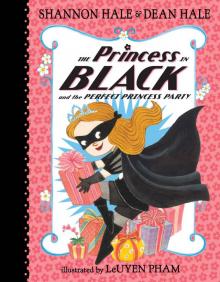 The Princess in Black and the Perfect Princess Party
The Princess in Black and the Perfect Princess Party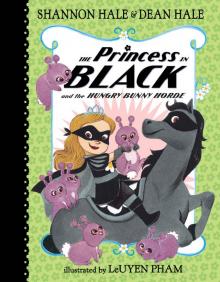 The Princess in Black and the Hungry Bunny Horde
The Princess in Black and the Hungry Bunny Horde The Unfairest of Them All
The Unfairest of Them All Forest Born
Forest Born 2 Fuzzy, 2 Furious
2 Fuzzy, 2 Furious The Actor and the Housewife
The Actor and the Housewife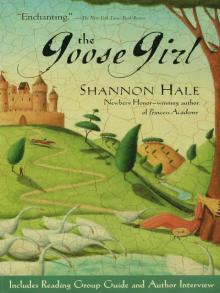 The Goose Girl
The Goose Girl Palace of Stone
Palace of Stone Midnight in Austenland
Midnight in Austenland Enna Burning
Enna Burning Dangerous
Dangerous The Storybook of Legends
The Storybook of Legends Princess Academy
Princess Academy Austenland
Austenland The Forgotten Sisters
The Forgotten Sisters The Unbeatable Squirrel Girl: Squirrel Meets World
The Unbeatable Squirrel Girl: Squirrel Meets World Book of a Thousand Days
Book of a Thousand Days Fire and Ice
Fire and Ice The Princess in Black Takes a Vacation
The Princess in Black Takes a Vacation River Secrets
River Secrets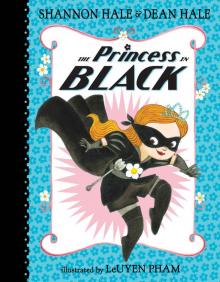 The Princess in Black
The Princess in Black Books of Bayern Series Bundle
Books of Bayern Series Bundle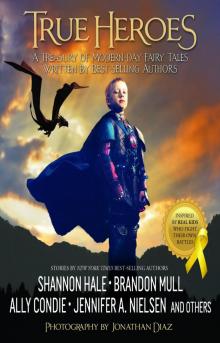 True Heroes
True Heroes Austenland: A Novel
Austenland: A Novel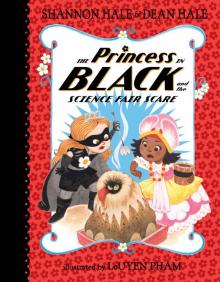 The Princess in Black and the Science Fair Scare
The Princess in Black and the Science Fair Scare![[Bayern 02] - Enna Burning Read online](http://i1.bookreadfree.com/i1/04/02/bayern_02_-_enna_burning_preview.jpg) [Bayern 02] - Enna Burning
[Bayern 02] - Enna Burning Ever After High
Ever After High Monster High/Ever After High--The Legend of Shadow High
Monster High/Ever After High--The Legend of Shadow High